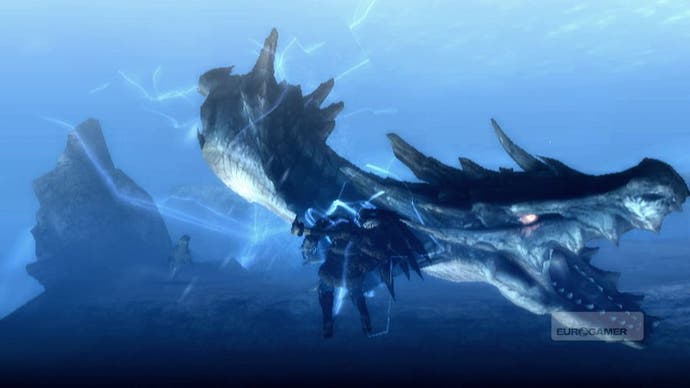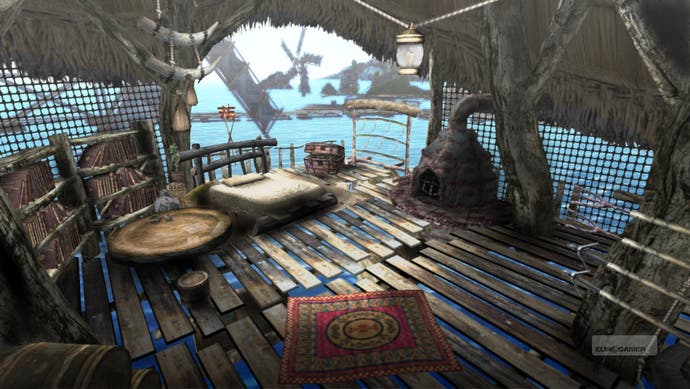Monster Hunter Tri
Tri bien.
Your hunter's movement underwater feels fluid and natural; all the controls are exactly the same, save pressing extra buttons to dive deeper or rise to the surface. There's an air gauge, but it's very difficult to run out. Venturing into the seas is daunting, yes, but because it's atmospheric, dangerous and unpredictable down there, not because it's annoying to control and easy to drown.
The underwater monsters are frankly terrifying - maybe not the passively floating fishies, but certainly the sharks, which have a disconcerting habit of appearing from nowhere, and the amphibious reptiles that swarm speedily around you like genetically-modified crocodiles, and especially the typically massive boss monsters. Their speed and agility far outstrips what you're capable of and the eeriness and atmosphere of the vast ocean makes for a compelling setting for the series' trademark epic battles.
Like its predecessors, and Demon's Souls, my other personal obsession of this year, Monster Hunter Tri involves an awful lot of dying. It's your wee hunter against boss monsters a hundred times his size, and understandably he doesn't usually come out of it without a scratch. The core of the game is still about facing up to the impossibly powerful foes and, eventually, after many, many tries and with a lot of skill, overcoming them. It's still the tough bastard of a game that we know and love, thankfully.

There are actually fewer different types of armour, weapon and item in Tri than in 2nd G on PSP, fewer complicated menus and stats and upgrade trees - gone are my beloved gunlance, the clever hunting horn, the powerful long-range bow and the nifty, quick dual swords. New weapons are the Switch Axe, which is proving most popular online in Japan at the moment, and bowguns comprised of various different customisable parts. The battle system itself has barely changed at all since Monster Hunter 2 though. Even the animations look extremely familiar; extra challenge for veterans comes from new and different monsters, not a new control system to wrestle with.
The game is also much improved by having a proper control system for movement and camera rather than the impossible PSP analogue-stick-and-directional-pad combo, though there is a Classic Controller control setup that mirrors the PSP's (presumably for masochists). Tri avoids patronising MH2 veterans - if you've spent far too much of your life on Monster Hunter 2, you can leap straight into Tri without much new to learn - but it also provides a gentler learning curve for new players and a choice of control schemes. It will still take tens of hours to get properly good at Monster Hunter Tri, but getting to the stage where you don't get your arse handed to you every 10 minutes will be a much more enjoyable process.

The most exciting thing, though, is the prospect of playing online with friends without messing around with ad-hoc party or complicated PSP hacking or subscription fees. Monster Hunter is primarily a multiplayer game, but thus far it's been nearly impossible to experience it as such in the West due to its relative scarcity. Tri is finally, finally going to change that for us, as well as providing a more developed and accessible evolution of the challenging, addictive, masochistically rewarding game that's won our hearts before. We have until March to polish our skills and prepare our self-worth for a spanking.
Monster Hunter Tri is out in early 2010.

